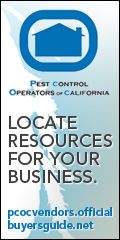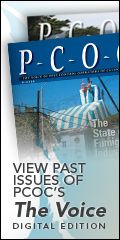
| February 2011 | Past Issues | Printer-Friendly | Advertise | Affiliates Search | Find a Pest Control Operator | PCOC.org |
|
EVP NOTES
The downturn in the economy has affected us all and has hit all nonprofit associations hard. Discretionary dollars are scarce and have to be weighed very carefully. PCOC has seen this over the last few years in terms of a reduction in membership and a resulting loss of revenue. This, despite hundreds of phone calls to delinquent and nonmembers, exhibiting our booth as often as possible, providing free district dinners to first time nonmembers and running membership contests—to name but a few of the actions we have taken. At the same time, our nondues revenue, which I emphasized when I began at PCOC, has also been affected by economic conditions. In addition, many of our sponsors have become more prudent with their contributions. I don't mean to preach doom and gloom. In fact PCOC is one of the soundest financial nonprofit associations in the state. Also, I believe there are signs around California that the economy is starting to rebound and this should give us cause for cautious optimism as we move forward. I also think that never has there been a time in the history of PCOC that the association needs to be strong. Anti-business forces have the ear of the Legislature and the governor in the Capitol: the unions, the trial lawyers and the radical environmental groups. They are all calling in chits after their support in the election and they all have an agenda ... the cumulative effect of which will be to shut down business in the state. This is the year for an aggressive education campaign with elected officials (more on that in a later issue as we approach our Leg Day) On the membership front, it is critical that we all step up our game. On the district level, I challenge each and every one of you to invite one of your colleagues who is not a member of PCOC to come to a meeting. In fact, if you send us the names of the nonmembers who attended we will take care of the rest: calling them and sending them materials on why they simply cannot afford NOT to be a member. This year's membership contest (see below) challenges us in an exciting way to focus on increasing the membership of PCOC. It is simply not enough these days for us to sit back and say "that is what a membership director is for." Certainly, we can initiate programs, make calls and do all kinds of follow up from the state office that you do not have the time to do. All of this ongoing activity is essential. Do you have any ideas on how we can try to increase membership (e.g., bringing back those who have been members in the past)? Send any and all ideas either to Mike McKenzie, our Membership Committee chair, mmckenzie@orkin.com, or Bill Gaither, PCOC director of membership and technical services, billgaither@pcoc.org. I believe that members of our industry who are not members of PCOC are taking advantage of the voice that PCOC provides to regulators and elected officials, to name but a few. The work that YOUR association does every day, protects the pest control industry in California and indeed makes it stronger through the programs that we offer. Let's work together to build our membership in the months ahead! Go for it! LEGISLATIVE UPDATE
UPCOMING EVENTS
JOIN US AT THE DISNEYLAND® RESORT FOR PCOC'S 68TH ANNUAL CONVENTION & TRADESHOW You can book your rooms and purchase tickets for the Theme Parks now. Just click on the appropriate link below: Room Reservations: https://resweb.passkey.com/go/pestcontrol2011 Theme Park Tickets: http://www.disneyconventionear.com/GDPF11A Please note: These special theme park ticket prices are not available once you arrive at the resort. Our ticket store closes at 9 p.m. PST on 6/19/2011 so don't delay. 2011
March 25-26
Board of Directors Meeting
Marriott Laguna Cliffs Resort
Dana Point, CA
April 26-27
Legislative Days
Hyatt Regency
Sacramento, CA
May 2
Bed Bug Symposium
San Ramon, CA
May 4
Bed Bug Symposium Orange County, CA May 5 Bed Bug Symposium San Diego, CA
June 3-4
Leadership Academy 2011
Silverado Resort
Napa, CA
June 23-25
PCOC's 68th Annual Convention & Tradeshow
Disneyland® Resort Hotel
Anaheim, CA
September 23-24
Board of Directors Meeting
Embassy Suites
Lake Tahoe, CA
December 9-10
Board of Directors Meeting
Hilton Palm Springs
Palm Springs, CA
BILLY'S BULLETIN BY BILLY GAITHER
MEMBERSHIP CONTEST Tamara Tibbett-Arendt of American Pest Control Company and Baron MacDonald of Clark Pest Control-Lodi are both tied for the lead in the membership contest. They have both brought in two new members. The contest runs until May 31, 2011. $1,000 will be awarded to the winner and there will be an additional drawing for another $1,000. Click here for contest rules. RECRUIT RECRUIT RECRUIT 2011 PCOC FUMIGATION BANNER BONANZA CONTEST
Dow AgroSciences will be sponsoring the 2011 Fumigation Banner Contest. The rules are the same as last year and we have provided a link to view the complete set of rules. The contest will run from March 1, 2011 thru May 31, 2011. There will be four winners again this year. Please mail all submissions to: PCOC
ATTN: Bill Gaither
Fumigation Banner Contest
3031 Beacon Blvd.
West Sacramento, CA 95691
Electronic submissions may be made at: billgaither@pcoc.org NPMA/PCOC BED BUG SYMPOSIUMS The resurgence of bed bugs has created significant concern among anyone responsible for providing housing to the general public. In response, NPMA has partnered with PCOC, the National Apartment Association, and the American Hotel and Lodging Association to deliver a workshop series designed to educate these audiences in effectively responding to the threat of bed bugs. This is a not-to-miss opportunity to interact with potential customers from the hotel and lodging, apartment, property management, and university housing markets.
On May 2, 2011 in San Ramon, May 4 in Orange County and on May 5 in San Diego, PCOC and NPMA will be hosting all-day seminars on bed bugs. Our target audience will be the hotel industry, apartment managers association and property managers and other related associations. These seminars will include presentations on bed bug facts and will include a panel of PCOs to answer questions. At each location will be an exhibit hall where PCOC member companies will be able to sponsor a booth and be available to interact with the seminar participants. More information and registration will be made available in the near future. NEWS FROM THE STRUCTURAL PEST CONTROL BOARD
On Jan. 20, 2011 the Structural Pest Control Board met and took the following actions: • TEST HOLES - Discussion was held as to whether making inaccessible areas (test holes) accessible during a WDO inspection (prior to issuing an original inspection report) is permissible under current statute. The staff counsel for the SPCB offered the following opinion. Existing law sets forth a comprehensive scheme devised to protect the consumer that cannot be interpreted as allowing test holes in initial (original) inspections. Existing law addresses both visible and infestations and the possibility of infestations in inaccessible areas. This careful and thoughtful scheme protects consumers and avoids the invasive practice of making test holes. The SPCB is obligated to enforce the laws as written. When questioned regarding enforcement action regarding test holes, Kelli Okuma stated that: Companies making test holes during an original inspection without first making a written report with recommendations for test holes would be subject to cite and fine violations. Companies offering to do test holes for consumers must first make an original report noting the inaccessible areas, make recommendations for the installation of test holes, file a supplemental report and corresponding Notice of Work Completed and Not Completed to comply with current regulations. • Report Requirements under Section 8516 (b) 10 - At a previous SPCB meeting, board staff was directed to draft language regarding the exclusion of subterranean termites pertaining to the local treatment statement being placed after each recommendation for local treatment in the body of a WDO report. After discussion it was decided to move forward with suggested language. ENDANGERED SPECIES STIPULATED INJUNCTION MEGA-SUIT
Landmark Lawsuit Filed to Protect Hundreds of Rare Species from Pesticides Suit Targets EPA's Failure to Safeguard Species Around the SAN FRANCISCO—The Center for Biological Diversity and Pesticide Action Network North America today filed the most comprehensive legal action ever brought under the Endangered Species Act to protect imperiled species from pesticides, suing the U.S. Environmental Protection Agency for its failure to consult with federal wildlife agencies regarding the impacts of hundreds of pesticides known to be harmful to more than 200 endangered and threatened species. "For decades, the EPA has turned a blind eye to the disastrous effects pesticides can have on some of America's rarest species," said Jeff Miller, a conservation advocate with the Center. "This lawsuit is intended to force the EPA to follow the law and ensure that harmful chemicals are not sprayed in endangered species habitats." "Endangered species and biological diversity are strong indicators for the health of the natural-resource base on which we all depend. To the extent that we fail to protect that base we erode the possibility of prosperity for future generations," said Dr. Heather Pilatic, codirector of PAN. "This suit thus presents a real opportunity for American agriculture: By enforcing the law and counting the real costs of pesticide use, we strengthen the case for supporting a transition toward more sustainable pest-control practices like crop rotations and beneficial insect release." The lawsuit seeks protection for 214 endangered and threatened species throughout the United States, including the Florida panther, California condor, piping plover, black-footed ferret, arroyo toad, Indiana bat, bonytail chub and Alabama sturgeon. Documents from the U.S. Fish and Wildlife Service and EPA, as well as peer-reviewed scientific studies, indicate these species are harmed by the pesticides at issue. More than a billion pounds of pesticides are used annually in the United States, and the EPA has registered more than 18,000 different pesticides for use. Extensive scientific studies show widespread and pervasive pesticide contamination in groundwater, drinking water and wildlife habitats throughout the country. Many EPA-approved pesticides are also linked to cancer and other severe health effects in humans. Some pesticides can act as endocrine disruptors, interfering with natural hormones, damaging reproductive function and offspring, and causing developmental, neurological and immune problems in wildlife and humans. Endocrine-disrupting pesticides cause sexual deformities such as intersex fish (with male and female parts) that cannot reproduce. Scientists believe that pesticides may also play a role in the recent colony collapse disorder, the disappearance of bees that are agriculturally important pollinators. This is the lawsuit that will extend the Bay Area Stipulated Injunction throughout the whole United States. This lawsuit will affect all active ingredients currently being used in our industry and will cover every endangered species throughout the nation. What the San Francisco Bay Area is now working under (in the Stipulated Injunction) will in time take effect not only throughout the rest of California but also the entire United States. PCOC and NPMA will continue to monitor its progress in the counts and keep our members informed. Fumigators Note Research, 50th Anniversary of VIKANE® Gas Fumigant
LONG BEACH, CA—Jan. 12, 2011 – Research was the focus at a special meeting of the Fumigator Group of Southern California (FGSC) Jan. 12 in Long Beach. More than 100 industry representatives heard Dr. Vernard Lewis of the University of California-Berkeley review past and present research in support of structural fumigation. The meeting also took special note of 2011 as marking the 50th anniversary of the commercialization of VIKANE gas fumigant. Dr. Lewis reviewed the importance of research on the evolution of the structural fumigation industry. Research with sulfuryl fluoride in the 1950s led to the commercialization of VIKANE in 1961 by Dow Chemical, Lewis said. His own research began in the early 1990s and it helped confirm that structural fumigation with VIKANE eliminated drywood termites in entire structures. The elusive nature of drywood termites makes them difficult to research, he noted. It also limits methods for effective control, which makes ongoing support of structural fumigation important. Bed bugs are the focus of the University of California's most current research with VIKANE®. Lewis said UC-Berkeley research done by him and research assistant Gail Getty looked at factors that include relationship of cooler temperatures on the hatching of bed bug eggs, and modified dosage rates of VIKANE for control of bed bugs during fumigation of infested residences. He thanked Beneficial Exterminating and Dow AgroSciences for their assistance with the research. Master of Ceremonies John Sansone, FGSC chair and a president of Cardinal Professional Products, welcomed attendees that included six past presidents of Pest Control Operators of California (PCOC), Getty of the University of California–Berkeley, and representatives of Cardinal, Univar and Dow AgroSciences. Dr. Lewis' presentation and the dinner were sponsored by Dow AgroSciences. The evening event raised more than $3,000 to support research and public outreach of the Urban Pest Management Center at the University of California–Berkeley. At the close of the evening, Janet Rowley, West Coast district sales manager for Dow AgroSciences, asked everyone to stand and then take their seats if they did not participate in VIKANE milestones – beginning with the recently introduced California Aeration Program and moving back in time to the introduction of bagging food. At the conclusion, 11 people standing each received a $50 gift certificate, corresponding to the 50 years of product use. They were Bobby Gordon, Gordon Termite Control; Rick Rousselle, Rouselle Inc.; Jim Finley, Antimite; Art Guzman, Univar; John Sansone, Cardinal; Earl Jones, Jeff Jones and Brian Jones, Admiral Pest Control; Curtis Good, Newport Exterminating; Willie Payne, Payne Pest Management; and Darrell Ennes, Terminix (Sacramento). Rowley said the evening evidenced successful structural fumigation industry change and adaptation over five decades. "Often change has been driven by our regulatory climate," Rowley said. "I see significant work ahead, but we at Dow AgroSciences are ready to work through significant regulatory events. Time has shown that a successful resolution can and will occur with the support of everyone in this room." To conclude the evening guests each were presented with an embossed 50th anniversary VIKANE champagne flute as a keepsake, and a toast was made by Rowley: "To the survivors of change, to the successors of change and to another 50 years together!" About Dow AgroSciences The Dow AgroSciences Urban Pest Management business is a leader in providing innovation solutions for the structural pest management, post-harvest commodity and turf and ornamental market segments. Dow AgroSciences LLC, based in Indianapolis, Ind., USA, is a top-tier agricultural company providing innovative agrochemical and biotechnology solutions globally. The company, a wholly owned subsidiary of The Dow Chemical Company, has sales of $4.5 billion. Learn more at http://www.dowagro.com/. ®™ VIKANE is a trademark of Dow AgroSciences LLC. Always read and follow label directions. For additional information, please contact Justin Stewart, 615-824-3225, jmstewart@dow.com or Cheri Mantz, 262-938-5418, cmantz@bader-rutter.com. MEMBER VALUE PROGRAM
PCOC MONTHLY INSURANCE/SAFETY TIP
Hiring a worker as an independent contractor has many advantages for employers—these workers are responsible for their own workers' compensation, benefits and withholding. But misclassifying regular employees as independent contractors can lead to costly fines and penalties. As the economy slowly rebounds, employers who have laid off workers may be reluctant to staff up again. Hiring someone on an independent contractor basis has many advantages for these employers. They can hire independent contractors on a per-project basis and let them go when the project is completed. They can often hire experienced workers who want to maintain a degree of independence. And they don't have to pay benefits or workers' compensation. Or do they? In the late 1980s and early 1990s, many companies faced steep fines for failing to provide workers' compensation to workers who were misclassified as independent contractors, particularly in the garment and manufacturing industries. Although today most companies are now more aware of the problems of misclassifying workers, problems do still arise. Misclassifying someone as an independent contractor when they really should be classified as an employee can lead to back taxes, penalties and fines, so it pays to know the difference. Generally, the degree of control you exercise over the worker determines whether he or she is an employee or independent contractor. For example, an employer usually provides a worker's materials; an independent contractor often provides his/her own. An employer sets an employee's work hours; an independent contractor usually has the right to set his/her own schedule. The following criteria can help you determine whether a worker is an employee or an independent contractor. Employee - Must obey instructions concerning when or how to perform the job. - Company provides training. - The job is "integrated," or central to the company's operations—the more integrated, the more likely the worker will be considered an employee. - Services must be performed by a particular person. - Has an ongoing relationship with the company. - Company sets the work hours. - Company requires full-time work at its business. - Company controls where the work is performed. - Company determines the order in which tasks are to be done. - Company requires oral or written reports. - Receives payment by hour, week or month. - Company provides tools and materials. - Company pays travel/business expenses. - Company can discharge a worker for reasons other than not meeting a contract's terms. - Can usually quit without liability for failure to complete a job. Independent Contractor - Responsible for the outcome of the job and can determine how it is to be done. - May be licensed by a state board; may have invested considerable sums in training. - Can hire assistants and is responsible for their pay. - Advertises or otherwise makes his/her services available to the general public. - Can set his/her own work hours. - Can work for more than one company at the same time. - Usually paid on a per-job or commission basis. - May have made significant investment in tools. - Can realize a profit or loss from a job. - Liable for completing a job according to contract. If you're still unsure whether a worker qualifies as an independent contractor, you can request a ruling from your state department of labor or employment. For information on classifying employees for workers' compensation purposes, please call the PCOC Insurance Program department at Jenkins Insurance Services at (800) 234-6363. NEW MEMBERS
FREQUENTLY REQUESTED INFORMATION
TEMPORARY NPMA LOGIN FOR JOINT MEMBERSHIP LOGIN: 313501 PASSWORD: PCOC PCOC Web site password for 2010-2011: "termite" Please remember, the password changes every July 1! Department of Fish & Game Department of Food & Agriculture Department of Pesticide Regulation Find Your Legislator Healthy Schools Act Structural Pest Control Board |
Pest Control Operators of California |
 |







